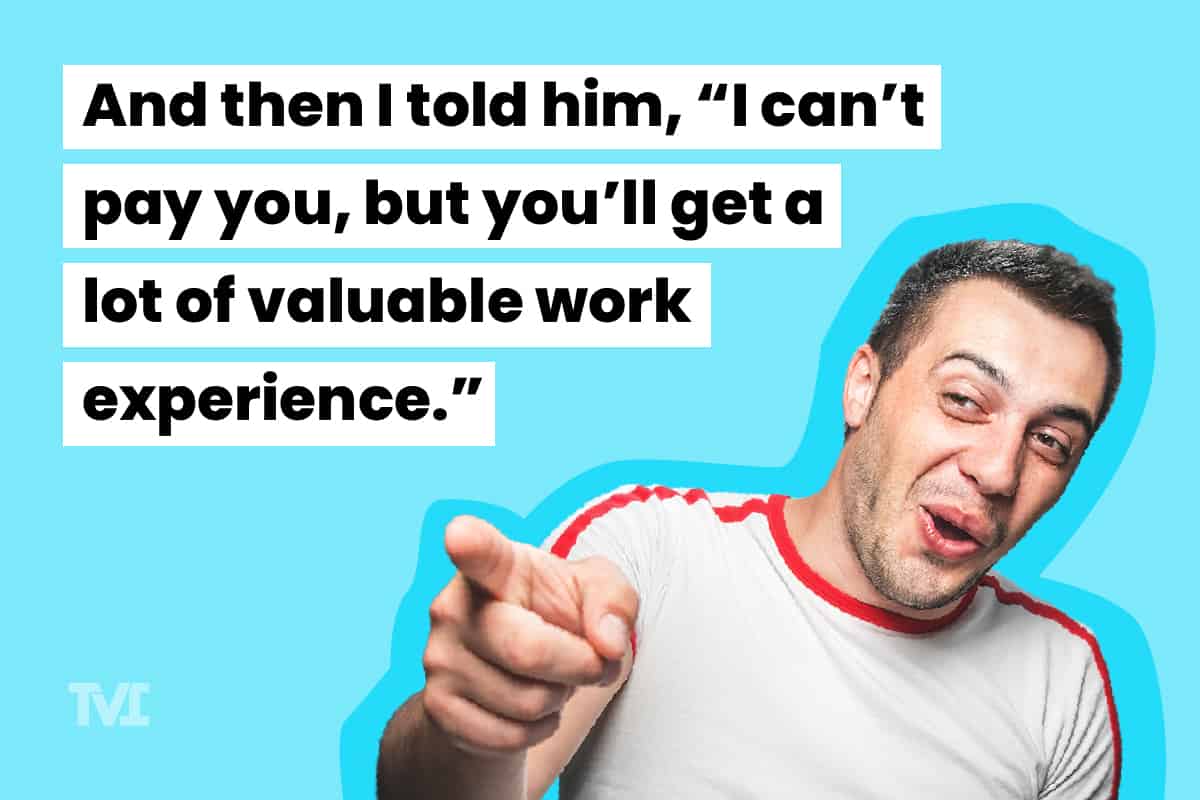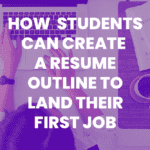Table of Contents
A wise man once said, “Advice, like fruit, is best when it’s fresh.”
That man was Jason Fried, founder of Basecamp, and I think he’s right:
Advice quickly decays, and 16-year-old advice is bound to be radioactive. Sharing a life experience is one thing (grandparents are great at this — listen to them!), but advice is another thing. Don’t give advice about things you used to know. Just because you did something a long time ago doesn’t mean you’re qualified to talk about it today. (Source)
Does this quote make you think of your parents? It does for me. Despite the fact that I earn more than my mom these days, she still feels compelled to dish out career advice to me whenever she can.
Here’s the thing: Our parents grew up in a completely different time than us, and many have held the same job for decades. That’s just not the way the world works today.
If you want to know how to land a good marketing job, it’s best to speak with someone who recently landed a good marketing job.
If you want to know how to prepare for an interview, it’s best to speak with someone who recently killed an interview and landed a job because of it.
The adults in your life may have some good advice to share, but when it comes to job-hunting, it’s time to rethink some of the lessons they’ve given you.
I’ve already been through this process, so I’m going to break down some of the worst advice you’ll likely get from your parents (or teachers, family friends, guardians, etc.), and show you why it doesn’t apply.
I’ll be sharing plenty of more updated advice from people who have found recent success in the modern job market—myself included. Let’s dive in.
Badvice 1: Hit the pavement

My parents still push me hardcore to job search by walking around to buildings with an armload of cookie-cutter résumés that list every job I’ve ever had (even my high school laundromat job from over ten years ago; I’m a VFX artist now), shove it at the receptionist, ask to speak to the hiring manager right then and there and if they tell me s/he’s busy, say ‘no problem, I’ll wait’ and then just awkwardly loiter in their lobby until I am presented with the hiring manager—or much more likely if I ever tried this, forcibly removed. (Source)
This is a parent classic that’s ridiculously outdated, unless you’re hunting for a part-time hospitality or retail gig.
But outside of the service industry, the only thing you’ll get after handing your paper resume to an office assistant is a funny look. Not to mention, as remote working has become the norm in many businesses, there may be no office to visit IRL anyway!
Everything is digital today.
Companies expect applications to come through online channels: email, LinkedIn, or other online job platforms.
They may also use recruiters to find new hires—and those recruiters will most likely contact you on those same digital platforms.
If you’re in your 20s now, your parents likely grew up in the early days of the internet, before platforms worked as well as they do today. So it’s no wonder they’ll roll their eyes when you refuse to go door-to-door with a stack of resumes.
But rather than spending time making sure your resume looks perfect when printed, devote your energy to keeping your LinkedIn profile up to date. Create a few versions of a digital resume you can easily tailor and send out when you come across jobs that interest you.
Badvice 2: Put your SAT scores on your résumé

When I had just graduated college (mid-recession btw), my parents insisted that I should apply to jobs that required 5+ years experience in a specific field and just put my SAT scores on my résumé. That way they would see that I was smart, and decide to hire me and train me instead of hiring an experienced professional with the skills they needed. (Source)
Take it from a college dropout who has had all of two people in her seven-year career ask her why she doesn’t have education listed on her résumé… Do NOT center your résumé around your education.
In fact, a study from The Chronicle of Higher Education found that most employers are more interested in soft skills and job experience than academics.

I always recommend placing your education at the very bottom of your résumé, and if you’re running out of space on your resume, the education section can be one of the first things you cull completely.
While jobs often still require a college degree, many employers understand that four years of higher education isn’t for everyone. There are lots of alternatives to college that can give you skills, experience, and knowledge necessary for desirable, well-paying jobs.
No one cares about your SAT scores or GPA, unless you’re applying for college. They absolutely do not need to be listed on your resume, plain and simple.
What should you put on your resume instead? We have some more resources on that right here:
Badvice 3: Immediately accept a job offer

Recently I had a second interview with a company where I met with the other owner and learned a lot of new information, including salary and schedule. At the end of the interview, I was offered the position and I said I would like a day to think it over and talk about it with my family. They said of course and that they would always expect that. Later, when I was talking with my parents, my dad got mad that I would even think about asking them for a day. He said that nobody should be at an interview if they didn’t already know they want to take the job, and furthermore if anybody he interviewed ever said that to him, he would rescind the offer immediately and show them to the door! (Source)
So you received a job offer! Congratulations, but don’t lose your head.
Would you marry the first Joe Schmoe who asked you on a date? I hope not. You don’t know that much about him—if anything yet.
The job seeker in the above example was only on her second interview. How in the heck could she possibly know beforehand whether or not she wanted the job? That’s what the job interview is for.
Remember: The job interview is just as much a chance for you to learn about a company as it is for them to learn about you. Taking a few days to do additional research, reflect on the interview, and weigh your options isn’t just normal—it’s expected.
First and foremost, you want to be excited about the job you’re about to embark on if you want to do good work, so you should ask yourself some key questions, like:
- Do you want to negotiate? If so, what?
- Is there anything about the job [offer] that you don’t understand?
- Do the benefits fit your needs?
- Does this job meet my basic requirements for happiness?
- Do I have a solid understanding of my boss’s expectations of me?
- Am I excited about this job?
- Can I see myself working with my prospective co-workers and manager?
- Does the culture feel right? (This one is important!)
- Is this job going to help me progress faster in my career?
- Does this feel like the right move for what I want to do in my life?
There’s no shame in asking for more information if you aren’t able to answer any of these questions. Actually, if you ask follow-up questions, you’re showing your interest and your decision-making skills, and that’s something any hiring manager should be able to appreciate.
If a company gets upset with you for taking time to decide, that’s a major red flag—don’t be intimidated to choose too quickly, and if they’re pressuring you to make the choice immediately, then it may be time to walk away completely.
Instead of this bad career advice from your parents, check out some of this up-to-date advice about job interviews:
Badvice 4: Don’t job hop

I don’t have a funny example for this one, but I’m quite certain that parents give this awful advice to their kids all too often.
Back in the day, you got a job, and you stayed at the job forever, patiently awaiting and accepting measly .01% raises during the annual review process.
This is NOT the way things work today.
As I mentioned earlier, two-thirds of lifetime wage growth happens in the first 10 years of your career, and the fastest way to increase your income is to switch jobs.
A study by CareerBuilder found that members of the Millennial and GenZ populations stay at a role for under 3 years, whereas the average for Baby Boomers was over 8 years. Times have changed!

The main reason younger workers change roles so often is because they are seeking better opportunities—an increase in pay, more flexibility, or a role that’s simply a better fit for their life and values.
Of course, your employer would likely prefer that you stay put for as long as possible. But it’s up to them to offer incentives that will keep you on board—more than just free coffee and the occasional lunch on the company dime.
If you’re able to find a role at a different company that is a better fit and/or pays a better salary, there’s no harm in at least looking into it. Short employment lengths on your resume and LinkedIn aren’t seen as a negative thing like they were when our parents were younger.
For more on all this, check out our article that weighs the pros and cons of job hopping vs. staying at a job long-term.
Badvice 5: Stay in a “safe” job you hate

The example for this one is me.
My parents have always valued financial safety above everything.
On one hand, I understand why. It’s extremely important to be financially independent. But on the other hand, you need to take calculated risks if you want a fulfilling career.
Around 2013, I proudly told my father I was quitting my well-paying waitress job to relocate for a full-time (and well-paid) job in Boston.
As soon as the words flowed out of my mouth, my dad’s smile disappeared, and he immediately huffed (literally, while rolling his eyes): “You’re going to quit Houston’s?!”
He honestly could not fathom why I would leave such a “safe,” well-paying job, as if I couldn’t make it in a real job—it was just too risky.
Three months later, I was fired with only one month’s severance. I was devastated, but the company culture was a horrible fit for me.
I gave myself one hour to cry in bed. Once the hour was up, I opened my laptop and began emailing everyone I knew and applying to every job I could find.
I found work almost immediately, thanks to my network of weak ties, and when I eventually relocated back to Florida (two years later), I did so because I chose to, not because I was forced to.
I’ve been financially independent ever since, and I’ve never had to work another crappy waitress job again.
Just remember: when someone tells you, “You can’t,” the only logical thing to do is show them you can.
Badvice 6: Work for free

I’m being ‘advised’ by my parents that ‘five times as many candidates as job openings be damned!’ and ‘Just go up to an employer (who may or may not even have a job opening advertised), tell them you’ll work for them for free for one week and if they’re happy with the job you’re doing, then they should hire you.’ (Source)
Point one: It’s really not okay to work for free
Before my father cut me off, I worked for free as an unpaid intern.
My internship experience was enjoyable. I liked everyone I worked with. I liked the professional environment. And I loved doing real work. So why do I regret working for free then?
Because working for free isn’t fair to all the people who can’t afford the luxury of working for free.
But let’s pretend for a second that I didn’t care about anyone but myself. Now, is it okay to work for free?
My answer is still a resounding no, because it’s going to hurt the future me, as I learned the hard way.
Point two: You’re only worth as much as your last job
After I quit my unpaid internship, I began applying to full-time marketing jobs.
“I have all this great experience now; why shouldn’t someone want to hire me?” I naively thought to myself. Boy, was I wrong.
Employers didn’t care that I had loads of valuable experience to offer them. All they saw written all over my résumé was “unpaid intern.”
It was so wildly depleting to hear, “We don’t think you’re right for this position, but we do have an unpaid internship that we think you would be perfect for,” over and over and over again.
I could not afford an unpaid internship anymore, but they didn’t care.
I quickly learned that I was only worth as much as whatever my last job was willing to pay me.
Point three: People who expect you to work for free will always expect you to work for free
I didn’t want to quit my unpaid internship, because, as I mentioned earlier, I enjoyed what I did and who I worked with. So, I decided to pitch my boss on paying me and bringing me on full-time.
To my naive dismay, they said no. They had just brought on a younger unpaid intern, who I had recently trained, so they didn’t need me.
That’s when I learned that just because you work for free doesn’t mean you’ll get anything out of it — ever.
Badvice 7: Avoid this like the plague

A 2019 study from The New York Times has some rather alarming statistics about parents butting into their children’s job application processes. A full 22% of parents admitted to writing some or all of their child’s job application, and another 11% said they’d gotten in touch with their kid’s employer to discuss issues at the workplace.
The study doesn’t discuss how well those jobs went for the kids, but if I had to wager a guess, I would estimate two things happened in most cases:
1. The employer wasn’t happy to discover that the worker they hired was not who was presented on paper.
2. The employer lost some respect for their worker after getting in an argument with mom or dad on the phone.
Please—I beg you—do NOT be one of these children (or parents, if you’re a parent reading this post).
If your mom or dad is one of these helicopter parents, try to limit the amount of information you give them about work.
And in the mortifying instance that your mom or dad crosses the line and takes your career fate into their own hands, have a script ready to send to your boss or potential employer.
For example:
I’m mortified that my mom emailed you! She means well, but of course she shouldn’t be involved in this conversation. Please don’t feel you need to respond to her, and I’ll ensure it doesn’t happen again.
Badvice 8: Your resume is the most important thing

Ah, the dreaded resume.
If your parents are anything like mine, they made you think your resume is the end-all and be-all of the job application process.
And in their day and age, that was true! But that was before the advent of the internet, and subsequently, social media. And the digital information trail you’ve left on the internet is going to factor into your job search whether you want it to or not.
Does this mean you need to go through your Instagram and delete all those photos of you in your less professional moments? Well, consider this about what you post online—there’s a chance your future boss will see it. If you think a certain photo or Tweet will deter your chances of getting a job, it’s probably best to delete it or make your social media profiles private.
But you can also use social media, and the connections you make there, to find the right career for you. Building a personal brand for yourself means you’ll attract the right kinds of jobs, and it’s a heck of a lot easier to send a link to your LinkedIn profile or personal website than it is to constantly update your resume PDF.
If you’re looking to get started on building a brand for yourself and turning your LinkedIn into your resume, check out these resources:
When parents give us career advice, it’s usually because they’re worried about our future and want us to do well. But it can be hard for them to understand today’s job market, and a big part of growing up is about forging your own path—even if it goes against your parents’ advice!














